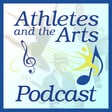
Downward Aria with Leslie Bickle
Yasi and Steve join Athletes and the Arts Founder Randy Dick in welcoming opera singer Leslie Bickle onto the show. Leslie discusses her journey from Canada to the UK, performing for the late Queen Elizabeth II, working with performers to overcome performance anxiety, and becoming a yogi and yoga's value in singing and performing.
Leslie's website: http://www.lesliebickle.com
Athletes and the Arts website: http://www.athletesandthearts.com
Bio: Leslie Bickle is an opera singer and Yoga Alliance certified yoga teacher specialising in vinyasa, mandala, yin and restorative yoga. She has an eclectic background as a music teacher, a ballet dancer, and she has played many different instruments including violin, cello and flute.
Originally from Canada, Leslie’s performing career has taken her across the globe. Recent role highlights include Donna Anna (Don Giovanni), Rosalinde (Die Fledermaus), Micaëla (La Tragédie de Carmen) and Ilia (Idomeneo). She was a National finalist with the Canadian Music Competition and National semi-finalist/Regional finalist with the New York Lyric Opera Theatre. She received the Catherine Osbourne Opera Award, and was a recipient of the Philip Hattey Scholarship and the Dame Eva Turner Scholarship. She also had the immense pleasure of meeting and singing for the late Queen Elizabeth II.
To date, Leslie has had the privilege of working with various companies in her native country of Canada and in Europe. This has included Opera Atelier, Muskoka Opera Festival, Amersham Festival of Music, Tapestry Opera, the Berlin Opera Academy, Canadian Stage Company, Toronto Opera Collaborative, Oakville Chamber Orchestra and the Toronto New Music Festival. In additional to her extensive singing background, Leslie is the founder of Yoga with the Breath, a health and wellness yoga start up company that provides education, classes and resources for performers, organisations and institutions. Leslie works with her clients to provide customised support to meet individual needs. She has a particular interest in optimising breathing and helping people manage performance anxiety. Leslie recently gave private and group yoga sessions and customised support for athletes at the Vitality 10km race with Our Parks UK.
Leslie is also a speaker and supporter of health and wellness for elite performers. She was invited to speak at the MHPC22 conference in Oslo Norway in the autumn of 2022. The MHPC22 international conference was for physicians, athletic trainers, therapists, and music and performing arts students and professions, who seek to improve the performance, health and well-being of musicians and performing artists within all genres. Most recently, Leslie was invited to speak at the international conference PAMA, where she gave a talk on performance anxiety and conscious breathwork.
Leslie is a graduate from the University of Toronto Faculty of Music, and the prestigious Royal Academy Opera programme at the Royal Academy of Music, and she currently resides in London, England.



